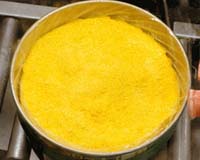 |
Washington (AFP) April 13, 2010 From gunmen storming a nuclear site in South Africa to Russian workers scheming to sell uranium, security breaches in recent years have raised fears about the safety of the world's nuclear material. With securing weapons-grade uranium and plutonium the focus of a 47-nation summit underway in Washington, here is a brief summary of incidents over the past two decades in which nuclear materials and know-how were stolen or put in jeopardy, due to flawed security or black market schemes. The events were reported by governments as well as Harvard University's Belfer Center for Science and International Affairs, which studies the spread of nuclear weapons and material. -- In 1993, a large amount of highly enriched uranium, 20 bombs' worth, is discovered in Kazakhstan amid lax security. Both Iran and Iraq had opened import-export businesses in the area. The United States removes the uranium, which is now stored in Oak Ridge, Tennessee. -- In 1998, Russian officials announce foiling a plot by employees at a major nuclear facility in the Chelyabinsk region to steal 18.5 kilograms of weapons-grade uranium. -- In 2000, Georgian police arrest four Georgian nationals with 920 grams of highly enriched uranium. -- In 2002, US and Russian authorities remove a store of highly-enriched uranium, enough to build three nuclear bombs, from a suburb in the Serbian capital Belgrade. -- In November 2003, an official at Atomflot, which oversees Russia's fleet of nuclear-powered icebreakers, is sentenced to 18 months for possession of illegal nuclear or radioactive materials. He had been arrested with more than a kilogram of uranium powder, or "yellowcake", described in some reports as mixed with radium or thorium. -- In 2004, nuclear scientist Abdul Qadeer Khan, father of Pakistan's atomic bomb, admits on television that he leaked nuclear secrets to Iran, North Korea and Libya. He later retracts his remarks. -- In 2006, a Russian man is arrested in Georgia for carrying 100 grams of highly enriched uranium and trying to sell more. -- In September 2007, Israel bombs a site in Syria, which Damascus says is an unused military facility. The United States alleges later the site was a nuclear reactor, based on a North Korean design, intended for use in an atomic weapons program using plutonium. Syria denies it has any nuclear project or deal with North Korea, as does Pyongyang. -- In November 2007, armed men break into South Africa's Pelindaba research nuclear facility, which houses enough highly enriched uranium for 30 nuclear weapons. They enter despite a 10,000-volt security fence and without setting off an alarm, indicating they may have had help from the inside. The gunmen spend 45 minutes inside and shoot an off-duty employee, escaping without stealing the uranium. A second team of armed men try but fail to break in elsewhere at the site. -- In 2008, an internal US Air Force probe concludes that most sites that store tactical nuclear weapons in NATO states fail to meet US security standards. -- In February 2010, six anti-nuclear activists climb over a fence at the Kleine Brogel military base in Belgium, which is believed to store 10-20 US nuclear weapons. The protesters walk around for up to an hour before they are arrested.
Share This Article With Planet Earth
Related Links Nuclear Power News - Nuclear Science, Nuclear Technology Powering The World in the 21st Century at Energy-Daily.com
 Ukraine to dispose of all highly enriched uranium
Ukraine to dispose of all highly enriched uraniumWashington (AFP) April 12, 2010 Ukraine pledged Monday to dispose of its stocks of highly enriched uranium by 2012, as the United States vowed to work with the nation still haunted by the Chernobyl accident over two decades ago. The surprise announcement came in a joint statement after US President Barack Obama met for the first time with Ukrainian President Viktor Yanukovych, who took office in the former Soviet republic ... read more |
|
| The content herein, unless otherwise known to be public domain, are Copyright 1995-2010 - SpaceDaily. AFP and UPI Wire Stories are copyright Agence France-Presse and United Press International. ESA Portal Reports are copyright European Space Agency. All NASA sourced material is public domain. Additional copyrights may apply in whole or part to other bona fide parties. Advertising does not imply endorsement,agreement or approval of any opinions, statements or information provided by SpaceDaily on any Web page published or hosted by SpaceDaily. Privacy Statement |